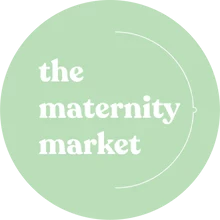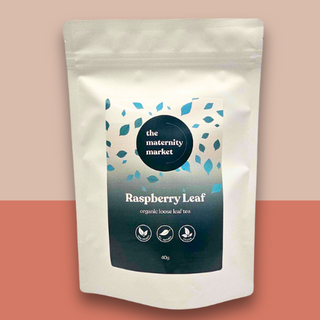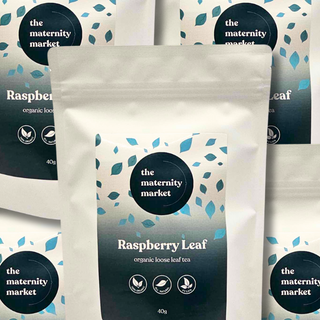Here's the tea...
Raspberry Leaf Tea is a super tonic for your uterus. It has been traditionally used during the later stages of pregnancy as a uterine tonic to strengthen and tone the uterus in preparation for childbirth.
Raspberry leaf tea may support and strengthen uterine health in the late stages of pregnancy and post-birth.
Potential health benefits include:
- Decreased labor time.
- Strengthen and support the uterus.
- Improve labor outcomes.
Drinking raspberry leaf tea has been known to induce labor so its great if you're close to or past your due date. Do not use this product earlier than 34 weeks into your pregnancy.
Raspberry leaf tea has also been known to help treat symptoms of PMS (hellooo menstrual cramps) and improve/support the overall health of your reproductive system.
This tea is:
- Organic.
- Caffeine-free.
- Cruelty-free.
- Gluten and Dairy-free.
- Vegan.
- Ethically sourced.
There are at least 40 serves per pack.
As always, because we are all about safety, please read ingredients, instructions, our safety disclaimer and any special disclaimers before purchasing.
Made from: Organic Raspberry loose leaf tea (Rubus idaeus)
Instructions: Add a teaspoon amount into your tea infuser or disposable tea bag and add to boiling water, letting the bag/infuser seep for at least 5 minutes. We recommend no more than one cup per day but if you are in the week of your due date, or overdue you can increase to two.
Stage of pregnancy: Third Trimester, Postpartum.
Special disclaimer: Do not use this product before your third trimester. Please discuss use of raspberry leaf tea with your healthcare provider before use. It’s important to consult with your healthcare provider before consuming raspberry leaf tea (especially if you have any high risk medical conditions) and discontinue use if you experience any adverse side effects, including spotting or Braxton Hicks contractions during pregnancy.
Raspberry leaf FAQs
How does raspberry leaf tea help pregnant women?
Raspberry leaf has been used as a herbal remedy by women for centuries and was used as a "medicine" before "medicine" even existed. Rasberry leaf is a rich source of antioxidants and is known for its anti inflammatory properties. Research and anecdotal evidence have shown that drinking raspberry leaf tea in the late stages of pregnancy may lead to potential health benefits including increased blood flow to the uterus and strengthening of the the uterine muscle fibres. This may help to improve the effectiveness of your contractions during labour.
Raspberry leaf tea is rich in vitamins and minerals, great for your overall health. It is a good source of essential Vitamins A, C and E as well as important minerals and nutrients like calcium, iron, magnesium and postassium. Having raspberry leaves alongside a healthy diet, particularly in the late stages of pregnancy can really help support your body and what it is about to go through.
What is the difference between this raspberry leaf tea and red raspberry leaf tea?
There is no difference between products branded as "red raspberry leaf" and "raspberry leaf" but you do need to check the ingredients as some teas labelled as "raspberry leaf" are sometimes a blend of raspberry leaves, rosehips, hibiscus and flavour which may not be as effective for your body. Basically, there is no "red raspberry plant" or "green raspberry plant", it's all Rubus idaeus, which is commonly known as red raspberry leaf or just raspberry leaf. Just look for good quality tea from a trusted brand.
Is raspberry leaf tea only for pregnant women?
If you are not pregnant and you are looking to drink raspberry leaf tea for general female reproductive health benefits it is totally safe to do so. Raspberry leaf tea may help with general PMS as it contains tannins and fragarine that may help reduce symptoms of PMS like cramping and nausea. It may also help balance hormones so it can help with those mood swings! Like chamomile tea it is also a muscle realxant so it can reduce uterine contractions and help if you're suffering from menstrual cramps.
Raspberry leaf tea may increase estrogen levels which also makes it great to drink if you are going through peri-menopause and menopause.
If you are drinking any herbal tea whilst trying to fall pregnant please do so in consultation with your doctor as consuming raspberry leaf tea too early in pregnancy, particularly in your first trimester, may be harmful.
What does raspberry leaf tea taste like?
Like many herbal teas, raspberry leaf tea has a rather subtle and slightly astringent taste. It isn't unpleasant but it is probably not a herbal tea you're going to want to drink forever. But hey, the health benefits far outweigh the taste!
Will drinking raspberry leaf tea after birth effect my breast milk?
Alongside the benefits to your uterine health, Raspberry leaf is a traditional remedy for boosting milk production in lactating women. It is safe to use while breastfeeding when drinking in tea but raspberry leaf supplements should be avoided as there is limited information on their safety.
Here's the tea...
Raspberry Leaf Tea is a super tonic for your uterus. It has been traditionally used during the later stages of pregnancy as a uterine tonic to strengthen and tone the uterus in preparation for childbirth.
Raspberry leaf tea may support and strengthen uterine health in the late stages of pregnancy and post-birth.
Potential health benefits include:
- Decreased labor time.
- Strengthen and support the uterus.
- Improve labor outcomes.
Drinking raspberry leaf tea has been known to induce labor so its great if you're close to or past your due date. Do not use this product earlier than 34 weeks into your pregnancy.
Raspberry leaf tea has also been known to help treat symptoms of PMS (hellooo menstrual cramps) and improve/support the overall health of your reproductive system.
This tea is:
- Organic.
- Caffeine-free.
- Cruelty-free.
- Gluten and Dairy-free.
- Vegan.
- Ethically sourced.
There are at least 40 serves per pack.
As always, because we are all about safety, please read ingredients, instructions, our safety disclaimer and any special disclaimers before purchasing.
Made from: Organic Raspberry loose leaf tea (Rubus idaeus)
Instructions: Add a teaspoon amount into your tea infuser or disposable tea bag and add to boiling water, letting the bag/infuser seep for at least 5 minutes. We recommend no more than one cup per day but if you are in the week of your due date, or overdue you can increase to two.
Stage of pregnancy: Third Trimester, Postpartum.
Special disclaimer: Do not use this product before your third trimester. Please discuss use of raspberry leaf tea with your healthcare provider before use. It’s important to consult with your healthcare provider before consuming raspberry leaf tea (especially if you have any high risk medical conditions) and discontinue use if you experience any adverse side effects, including spotting or Braxton Hicks contractions during pregnancy.
Raspberry leaf FAQs
How does raspberry leaf tea help pregnant women?
Raspberry leaf has been used as a herbal remedy by women for centuries and was used as a "medicine" before "medicine" even existed. Rasberry leaf is a rich source of antioxidants and is known for its anti inflammatory properties. Research and anecdotal evidence have shown that drinking raspberry leaf tea in the late stages of pregnancy may lead to potential health benefits including increased blood flow to the uterus and strengthening of the the uterine muscle fibres. This may help to improve the effectiveness of your contractions during labour.
Raspberry leaf tea is rich in vitamins and minerals, great for your overall health. It is a good source of essential Vitamins A, C and E as well as important minerals and nutrients like calcium, iron, magnesium and postassium. Having raspberry leaves alongside a healthy diet, particularly in the late stages of pregnancy can really help support your body and what it is about to go through.
What is the difference between this raspberry leaf tea and red raspberry leaf tea?
There is no difference between products branded as "red raspberry leaf" and "raspberry leaf" but you do need to check the ingredients as some teas labelled as "raspberry leaf" are sometimes a blend of raspberry leaves, rosehips, hibiscus and flavour which may not be as effective for your body. Basically, there is no "red raspberry plant" or "green raspberry plant", it's all Rubus idaeus, which is commonly known as red raspberry leaf or just raspberry leaf. Just look for good quality tea from a trusted brand.
Is raspberry leaf tea only for pregnant women?
If you are not pregnant and you are looking to drink raspberry leaf tea for general female reproductive health benefits it is totally safe to do so. Raspberry leaf tea may help with general PMS as it contains tannins and fragarine that may help reduce symptoms of PMS like cramping and nausea. It may also help balance hormones so it can help with those mood swings! Like chamomile tea it is also a muscle realxant so it can reduce uterine contractions and help if you're suffering from menstrual cramps.
Raspberry leaf tea may increase estrogen levels which also makes it great to drink if you are going through peri-menopause and menopause.
If you are drinking any herbal tea whilst trying to fall pregnant please do so in consultation with your doctor as consuming raspberry leaf tea too early in pregnancy, particularly in your first trimester, may be harmful.
What does raspberry leaf tea taste like?
Like many herbal teas, raspberry leaf tea has a rather subtle and slightly astringent taste. It isn't unpleasant but it is probably not a herbal tea you're going to want to drink forever. But hey, the health benefits far outweigh the taste!
Will drinking raspberry leaf tea after birth effect my breast milk?
Alongside the benefits to your uterine health, Raspberry leaf is a traditional remedy for boosting milk production in lactating women. It is safe to use while breastfeeding when drinking in tea but raspberry leaf supplements should be avoided as there is limited information on their safety.


